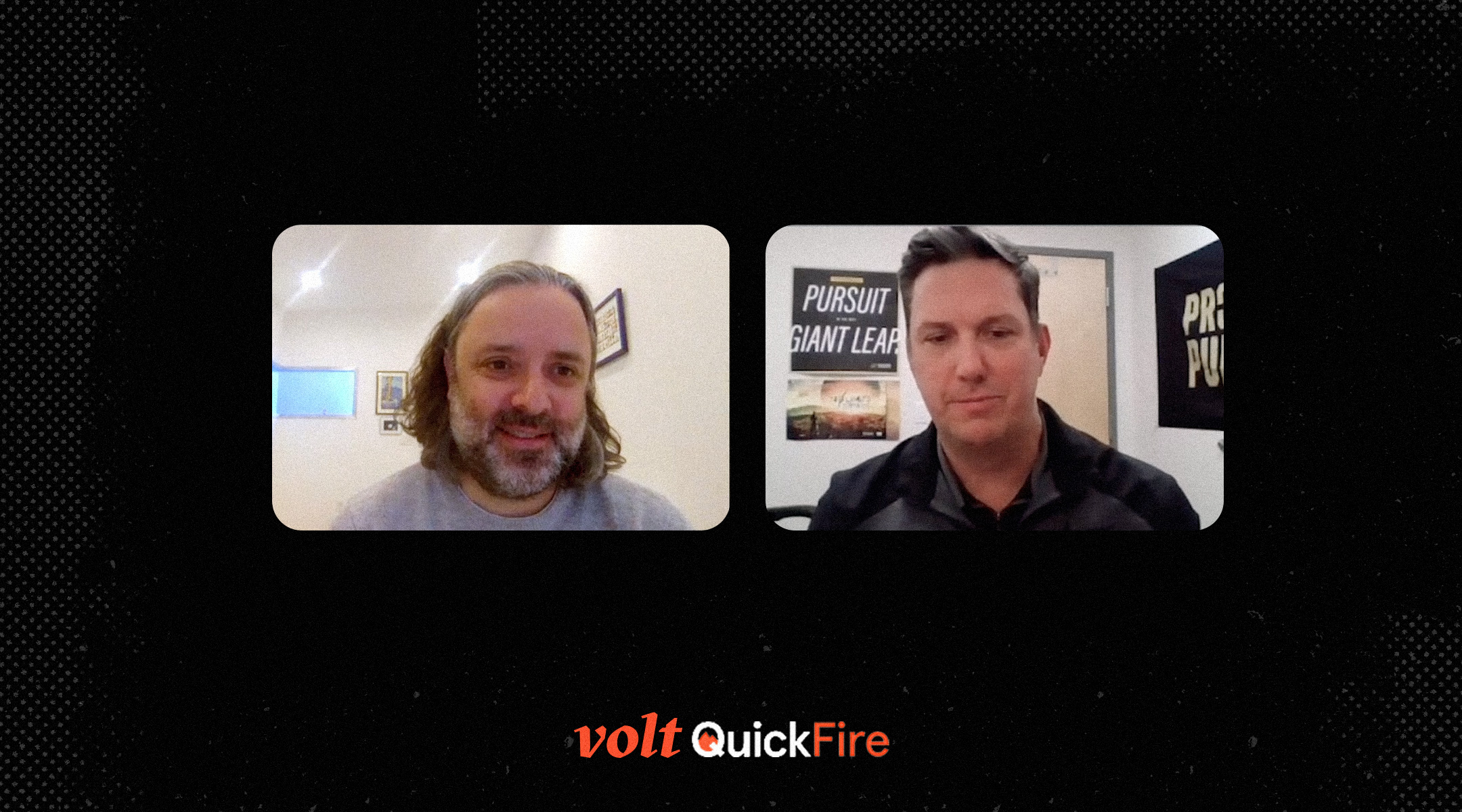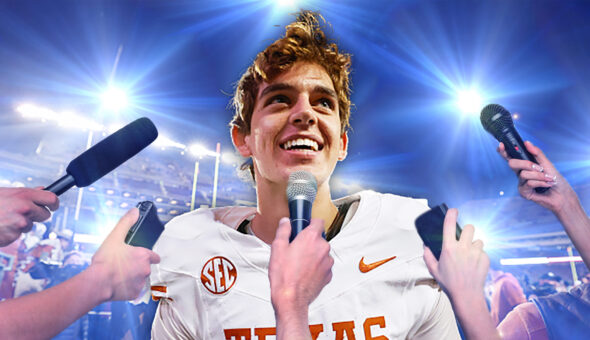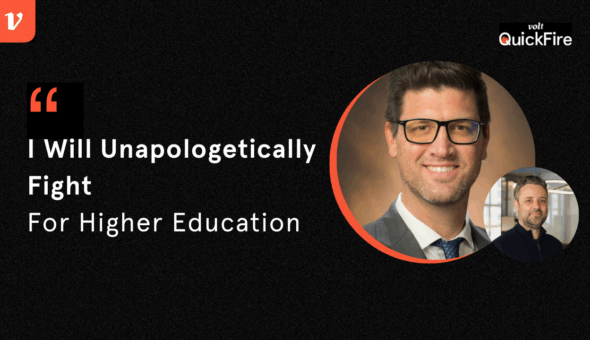Marketing is more than what the great philosopher Dilbert referred to as just liquor and guessing. Just ask R. Ethan Braden, Senior Vice President of Marketing and Communications at Purdue, who took over promotional efforts at the historic land-grant university in 2018 after a decade at Eli Lilly and Company. Since arriving in West Lafayette, Ind., he has overhauled and grown a team of 50-plus marketers to a team of 70, transforming what he described as a previously scattered approach into one in which all tactics are performed in service of a singular vision.
In Volt’s inaugural QuickFire, Braden answered 20 questions from Volt Publisher Kevin Renton, explaining why higher ed is “an incredible playground for brand marketing” and sharing personal insights about how he does what he does.
Go Deeper:
- Watch: Inside Purdue’s Brand Evolution
- Explore: Purdue’s Brand Marketers Toolbox
- Watch: Purdue University named American Marketing Association’s 2020 Higher Education Team of the Year
- Read: Fast Company Names Purdue a ‘Brand That Matters’
- Read: Purdue University Named a Top-10 Most Innovative University in America
Read the full transcript here:
Kevin Renton:
Hi, there. My name’s Kevin Renton, and welcome to QuickFire for Bull. This is where we put higher education markers on the hot seat and subject them to 20 rapid questions with the goal of understanding what makes them tick, what makes them successful, and what are their goals for the future? So in the crossfire today is Ethan Braden, Senior VP and Chief Marketing Communications Officer at Purdue University. Welcome, Ethan.
Ethan Braden:
Thank you. Thanks for having me.
Kevin Renton:
No, at all. Okay. Well, we’ll see if you’re thankful at the end of the 29th. Yeah, here we go. So rapid questions. First thing, give us your elevator pitch. Who are you and what do you do?
Ethan Braden:
So I’m Ethan Braden. I’m the Chief Marketing Officer at Purdue University, been here since November of 2018 when I moved up here with my wife and at that point, my son, we’ve since added a daughter, from Indianapolis, where I was there for 10 years at Eli Lilly and Company. I’m fortunate to report to president, Mitch Daniels, two term Governor of Indiana. And I lead the marketing communications effort now for Purdue University, a top 10 most innovative school in the nation for the last four years [crosstalk 00:01:16] 70 individuals in the positioning, the promotion, the protection of our precious Purdue University brand.
Kevin Renton:
So I wanted to work in higher education because…
Ethan Braden:
It’s an incredible playground for great marketing, thousand post-secondary degree, granting institutions in the US right now. So you have to know what you stand for, you have to differentiate, you have to appeal to target audiences, and it’s a place where there’s a ton of clay to mold something beautiful through great marketing fundamentals and discipline. So an incredible opportunity to utilize the marketing skills for the collective realization of our vision and our goals.
Kevin Renton:
In that playground, what’s the marketing tool you can’t live without?
Ethan Braden:
Probably different than some folks. Mine’s a book it’s Tim Calkins’ Breakthrough Marketing Plans. Mines is a north star of how we plan and how we think about going from, strategy to strategic initiatives to tactics. Instead of, I think falling into the trap that higher ed often does, which is just random acts of marketing tactics.
Kevin Renton:
What marketing technology do you use?
Ethan Braden:
Probably not as many as some, we’re not fully into a CRM, like some, but we do use marketing cloud. We use deliver or sprout social clients, for brand watch clients, for brand bashing clients. We use Workfront for project management. So there’s a host, but it’s a sophistication that we’ve evolved and grown over the last few years.
Kevin Renton:
Great. In the next five years, I’d like to…
Ethan Braden:
Build a higher education juggernaut, which is the portfolio of Purdue University to include Purdue global, right. We’ve we’ve got a West Lafayette campus, we’ve got a couple of regionals, but really the next stage of the land grant mission is taking the Purdue University brand and transcending state lines with technology. And we’ll do that in the form of Purdue global. And the other piece of that in the front side of that portfolio is incorporating graduates of our now three Purdue Polytechnic high schools that we’ve crafted in the state of Indiana, to create a pathway for students that were usually underserved by high school education and underrepresented in higher education.
Kevin Renton:
I admire the marketing at…
Ethan Braden:
I had no higher ed experience coming in to this job and I quickly enamored with and impressed by the work that Dan Dylan and team have done at Arizona state. He’s in a new role now, but I think the work that he’s done over there, the work that he did there for six years to really revolutionize the marketing, the vision he had for that team, the way he’s grown it, I had a lot of the things they’ve done and I’ve emulated a lot of the steps and decisions he made there.
Kevin Renton:
Is there any markets outside of higher ed that you look at and you’ve tried to bring into your work?
Ethan Braden:
We mimic a lot of other individuals. I mean, hopefully we’re very curious and we’re reading and assessing a ton. We’re really fortunate that recently we were named a brand that matters by Fast Company magazine, the only university in the nation to be named, to be selected and the only entity in the state of Indiana. But we look at those brands, right? We’re looking at the Yeti and the zooms and the Fords and the general motors and the 3MS. And we’re constantly stealing their ideas, their insights, their big ideas, their approaches, and saying whether or not we can run that play here. So I’ll steal and borrow ideas all day long versus have to create them ourselves. And we look into industry a lot to do that.
Kevin Renton:
The biggest challenge facing higher education marketers are…
Ethan Braden:
Go back to this notion of, what are you focused on and what are you working on? And is it a collective contribution to the realization and the vision of the college, the department, and ultimately the university, or is it random act of marketing day by day, oftentimes driven by the requests of non marketers? Are you working on posters and flyers and apps, podcasts that are unnecessary? Are you working on strategic contributions to the strategic initiatives that ultimately contribute to the realization of whatever those goals are ultimately for the university. So it’s being the driver of great marketing of brand of experiences for students and your constituencies, not being the driven by the daily asks and requests and needs, and the Dilberg perception that marketing is just liquor and guessing.
Kevin Renton:
What advice would you give to any marketer that wants to drive the marketing or as being driven by stakeholders within the institution?
Ethan Braden:
Yeah, I go back, you asked me the tool, right? Tim Calking’ Breakthrough Marketing Plans, it starts with really understanding what the terminal objective or the goal is. I need to understand my president or my boards or my deans or my department heads or my boss’s goal, so that I can ensure that my daily contributions, my marketing efforts are strategies, our tactics, our measurements, our investments are laddered to the achievement of that. And if they’re not, it shouldn’t be done and I need to compel and communicate, what’s the difference, right? They have the great story of the great British 98 rowing team. Does it make the boat go faster? I’m going to work on stuff that makes the boat go faster. And if it doesn’t, why are we doing it? And so that sort of understanding is the candor necessary, I think, to influence us working on things that matter versus those that don’t.
Kevin Renton:
Okay. My favorite social media channel is… and why?
Ethan Braden:
I hate, them all, I’d love to be off of them. [inaudible 00:07:02] What’s that? No, I have it. I constantly tell my wife. I hate them all. But I probably use Twitter more than anything. I’ve recently, I use Reddit a fair amount to get the voice of the student and to keep a pulse, on things that are mountains versus mull hills. But I use Twitter more than anything. And I do think there’s logic and there’s magic in who you follow. You can have a pretty good Twitter experience and a very learning one if you follow the right people and you choose to divorce yourself from the wrong ones.
Kevin Renton:
Which social media channel do you think your students are on?
Ethan Braden:
Well, I mean, we’ve seen it, there’s an explosion with TikTok. We still see great engagement with Instagram. And in fact, our boiler ambassadors have grown a very positive challenge just a year there with student generated content and very authentic content on their part. So those two are probably most that our students are sitting on though. We get great participation in Reddit and they certainly tell us how they feel. So those are two, there’s three really, but I can’t discount YouTube either, it’s, so powerful. And we’ve spent a lot of time over the last year, really growing our sophistication and our content and trying to remove friction there from people being able to watch and engage with the content that we want them to see. So it’s key as well.
Kevin Renton:
What biggest professional achievement is?
Ethan Braden:
Well, I cited the fast company honor, but that’s second. The biggest professional achievement I’ve had, and it’s not lip service is the team that we’ve been able to create over the last three years at Purdue. We’ve flipped 33 individuals of my initial 54, when I got here three years ago. We’ve hired 25 people COVID began during a hiring freeze. So makes sense of that. And so now I’ve got a group of 70 who I put up against anybody, both in higher ed and otherwise. There’s just this coalition of people who tremendously care. They’re good marketers, and they want to win. And so this team makes me more proud than anything I’ve ever done in my career.
Kevin Renton:
What’s working in higher ed right now?
Ethan Braden:
What’s working. I think the focus on the student experience, I think focus on deep student understanding, the curiosity that’s letting us walk in their shoes and understanding what they want, what they don’t, their frustrations, their aspirations, their tensions, their motivations, and then using our marketing to advance that through change, create, reinforce and change in some instances, attitudes, police behaviors, that’s the heart of marketing, but it’s got to start with our constituencies and our customer quote unquote turns for every four years in some respect and so deeply understanding who they are, what want, how they’re engaging again, addressing those motivations tensions, aspirations. We’ve got to deeply know that versus just operate from the gut or the student we think we know. So being very inquisitive, being very curious, being very empathetic and letting our marketing be driven by that understanding, those that are doing that well, I think are succeeding.
Kevin Renton:
The opposite. What’s not working in higher ed right now?
Ethan Braden:
I go back to the…, we’re just going to throw things against the wall and see what sticks, we’re going to give you posters, banners, flyers. Everyone needs an app. Everyone needs a podcast. Everyone needs a website. This just sort of disparate, Dilbert marketing is just liquor and guessing, those schools, those environments, where they’re stuck in that 30 years ago, 20 years ago, mentality are doing themselves and their brand of disservice because it’s competitive. And right now you need to be distinct. You need to be differentiated. You need to be valuable to gain that student and that student’s tuition or their parent dollars to come see you. And so those that are running that same antiquated play, I don’t like their chances long term.
Kevin Renton:
The future of higher education will be…
Ethan Braden:
Great book out right now. It’s not lifelong learning, but rather long life learning. I think that’s the key as we get older, as life expectancy increase, right? The things you learn from 18 to 22 are not going to suffice when you’re working at 70 if you so choose. When you’re living to a hundred or you’re living to 120. And so the future of higher education is the exits and the entries to higher education for people across their lives, across their careers. And when we make that hard and we won’t be as competitive, we make that easy and frictionless and attractive people will come to us to upgrade up-skill, et cetera. So who’s going to be in that space to do that extremely well. That’s the future in my mind.
Kevin Renton:
Okay. Ethan, what has been a key to your personal success?
Ethan Braden:
I guess I would, it is the coupling of curiosity and hard work. I’m deeply curious. I read like crazy. I want to master a subject matter and know it deeply that I’m passionate about. And that’s why I need to work in spaces where I’m truly interested student passionate about. But I think what most of what I’ve been able to accomplish, at least personally, what I’ve been able to bring the table myself has been learned. It’s been learned through hard work and it’s evolved through being curious,
Kevin Renton:
Hardest part of my job is…
Ethan Braden:
I guess I’ll use a Mitch Daniel’s quote and he, I don’t remember where he takes it from, but he uses it at time, he says “it’s lonely at the top, but there’s nobody there to hear it”. It’s true. Right? It can be lonely at the top and you’re shielding your people from feelings, from feedback, from unfairness, whatever it may be and that’s the job, leaders always have arrows in their back and you got to be willing to play that role if you want that role. And so you got to remember it when times are tough.
Kevin Renton:
Where do you go for that advice or that outlet to talk to somebody?
Ethan Braden:
Yeah, I’ve got a few. So my wife is tremendous. She gets an earful every night when I get about the day, and so she’s tremendous at that. I have a dear friend, mentor, executive coach in the form of a guy by the name of Mark Ferrara, who was at Lilly for 27 years or so and then now he works for Disney, and he’s just my Yoda. And the influence he’s had on me in the last year or so from a professional development standpoint and just personal development has been incredible. And then I got a couple friends who are the epitome of being supportive of the success of others versus ever being competitive or combative. Right. They want me to win and I want them to win. And those are special people. So I’ve got a handful that I go to fill my tank. And to you bend an ear.
Kevin Renton:
I love my job because…
Ethan Braden:
This job is incredible. I have an incredible product, we’re changing lives, right? It’s no disrespect to Hershey’s, but we’re not making chocolate around here, producing incredible graduates. We’re changing lives and we’re producing incredible research. So that, again, the clay to mold something very beautiful from a marketing standpoint, from a product standpoint is infinite and it’s incredible. And then I just, I have incredible people around me, on my team, my colleagues at the leadership level, we’re just blessed with some people who really care about Purdue. They’re really good at their jobs and they want to win. So I have a get to job, not a got to job for sure.
Kevin Renton:
It’s for job in higher ed. Was it everything that you expected it to be, hoped it would be, has it delivered on the promise?
Ethan Braden:
It’s incredible. I’m not sure I knew what to expect. And I’ve been pretty honest that I came into a pretty dilapidated, emaciated and antiquated marketing environment here. And so there was a lot of change necessary. There was a lot of change management and championing necessary, but what I love about it is it’s an incredibly complex marketing and right. 13 colleges at Purdue University, 50,000 here, 600,000 alums. We didn’t do a lot of cross brand learning, a lot of cross brand insight comparison at Lilly.
Ethan Braden:
But here you have the chance to say, hey, what are we learning about students in the college education versus the students in the college of engineering, what’s similar to what’s different. What are the insights? What can we do to really, to come across as a symphony and not a cat running through a wind chime factory. And being able to compare across is so powerful from a marketing standpoint, but it’s also complex. So it’s engaging and intellectually stimulating. But yeah, it’s lived up to everything I’ve wanted and it’s more similar to industry than I ever thought it would be.
Kevin Renton:
On that note. Ethan, Braden, Chief Marketing Communications Officer Purdue, thanks for your time and thanks for being on QuickFire with bull.
Ethan Braden:
Thanks for having me.
Kevin Renton:
No, at all. Thanks. Nice to meet you.









